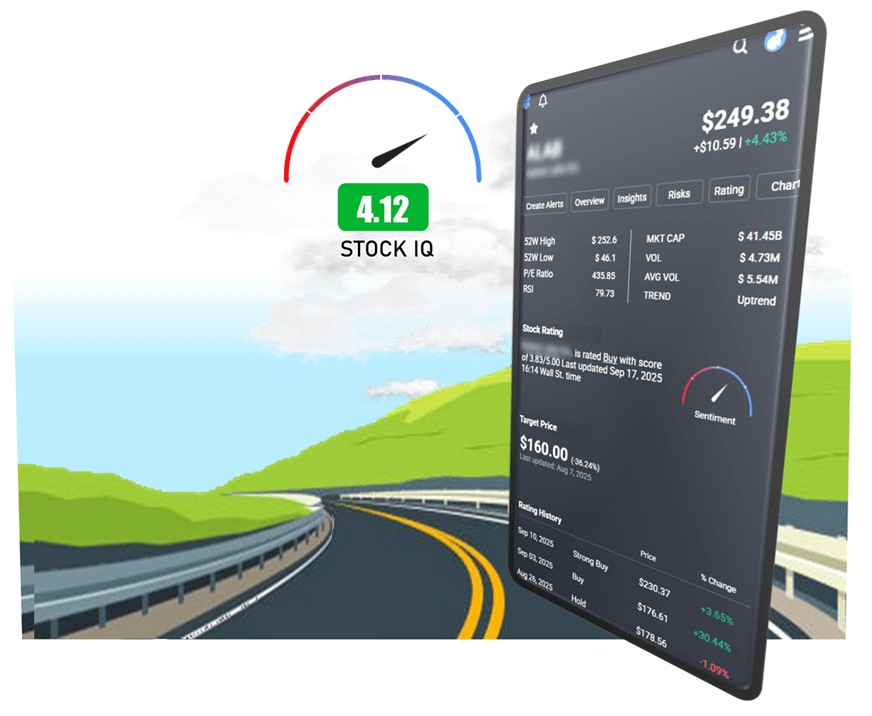

Find new investment opportunities based on Market Sentiment Indicator. Manage watchlist risk with leading indicator of volatility See what influential analysts and investors are saying about stocks in My Watchlist



Find new investment opportunities based on Market Sentiment Indicator. Manage watchlist risk with leading indicator of volatility See what influential analysts and investors are saying about stocks in My Watchlist


We're recalculating data and refreshing scores to deliver smarter, faster market intel. Check back shortly
Tons of Signals. One Clear Vision.


StocksRunner is an intelligence platform that transforms thousands of data sources into a single Stock IQ (1-5) for every stock, helping traders cut through market noise and make profitable decisions faster
We analyzes thousands of validated data points including market sentiment, analyst opinions, financial performance, technical indicators, and industry trends, measures how these factors historically impact stock prices over X day windows to generate a predictive Stock IQ from 1-5
Real-time price movement patterns, volume trends, and technical indicators combined with market psychology metrics
Trading volume analysis, institutional flows, and market participation data to gauge genuine interest levels
Aggregation and weighting of analyst recommendations, with bias correction and track record analysis
Forward-looking analysis combining industry trends, competitive positioning, and innovation metrics
StocksRunner automatically tracks these signals across thousands of stocks, filtering out noise to present only high-probability setups with clear Stock IQ, so you can spot profitable opportunities before the crowd catches on
Our multi-source approach filters out 99% of market noise, providing traders with proven signals that increase profitable trades while reducing investment risk
Validated intelligence separates fact from speculation, delivering filtered market insights within minutes of any significant event so you stay ahead while others are still processing the noise
Intelligence beyond opinion.

Stop trading time for research overload. Stock Credibility Scores in one click. Market insights without the noise. Smart investing made simple.
Join over 250,000 subscribers benefiting from StocksRunner's insights. Subscribe now for exclusive perspectives and stay ahead in the stock market. Provide your email to get daily alerts.
Real-time stock market updates
Expert Stocks Analysis
Investment strategies
Top stock recommendations
Trading signals and opportunities

StocksRunner.com is a Dynamic Platform Designed to Empowering Investors in the Fast-Paced World of Finance with market data, analysis, and insights. Whether you're a seasoned trader or just starting out, StocksRunner.com is your trusted companion for success in the stock market
FIND US ON
Access the valued insights treasured by over 5,000 subscribers. Enroll now for exclusive perspectives and stay ahead in the stock market. Provide your email for daily alerts
In-depth Stocks Analysis
Informed investment decisions
Stock market insights
Stock trading tips
Disclaimer:
The Score performance whether actual or indicated by historical tests of strategies, is no guarantee of future performance or success. The results reflect performance of a strategy not historically offered to investors and does not represent returns that any investor actually attained.
The results reflect performance of a strategy not historically offered to investors and does not represent returns that any investor actually attained. The Readiness Indicators, Sentiment Indicators and total score are calculated by the retroactive application of a model constructed on the basis of historical data and based on assumptions integral to the model which may or may not be testable and are subject to losses. Active trading is generally not appropriate for someone of limited resources, limited invesment or trading experience, or low-risk tolerance. Your capital may be at risk.
Please note that no offer or solicitation to buy or sell securities, securities derivatives of future products of any kind, or any type of trading or invesment advise, recommendation or strategy, is made, given or endorsed by StocksRunner including any of their affiliates ("TS").
This information is provided for illustrative purposes only. You should not rely on any advice and/or information contained in this website and before making any investment decision. we recommend that you consider whether it is appropriate for your situation and seek appropriate financial, taxation and legal advice.